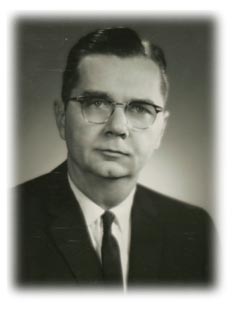Austin College Presidents
AC centennial through the present
1953-1978
Chancellor, 1978-1981


1978-1994
1994-Present

Austin College Presidents AC centennial through the present |
||
| John Dean
Moseley 1953-1978 Chancellor, 1978-1981 |
|
|
| John D. Moseley was the second lay president of Austin College during its history. He was born in Greenville, Texas, November 17, 1915. He received his Bachelor's degree at East Texas State University and a law degree from the University of Texas. Moseley had already established a high reputation in public administration both in Texas and in Washington, D.C., when he came to Austin College in 1953. Under his administration, the College saw unprecedented growth and change, physically, socially, and academically. During the 1950s, Clyce Hall, Baker Hall, and Wynne Chapel were added to the physical plant. During the 1960s, Arthur Hopkins Library, Moody Science Center, Craig Hall, two more dormitories, Caruth and Dean Halls, and the Guy M. Bryan apartments were constructed. In the 1970s, the Jonsson Plaza, Windsor Mall, Ida Green Communication Center, Sid Richardson Recreation Center and Hannah Natatorium were completed, and the college established a lake campus at Preston Point on Lake Texoma. During Moseley's administration, segregation ended, as did compulsory chapel attendance; women were elected as student body presidents, Dean Hall became co-ed, Mary Foulks Gourlee became the first woman to chair the science department, Evelyn Milam became the first woman Director of Admissions, and Abraham Nelson, Jr. became the first African-American member of the full-time faculty. The campus witnessed expansion and experimentation in programs and curriculum. Crossroads Africa, Summer Seminars abroad and in Mexico, A Capella Choir tours, and an all-amateur athletics program were instituted. January Term was initiated in 1968, but even earlier, Moseley pioneered the integrated core curriculum with the help of a large grant from the Ford Foundation. Freshman English was supplanted by Communication/Inquiry, and interdisciplinary studies such as Asian Studies, Latin American Studies, and Communication Arts appeared. Black History, Ecology, Macroeconomics, and Computer Science were added to the curriculum. During Moseley's administration, the control of the Presbyterian Synod over the Board of Trustees was replaced with a covenant relationship between the college and church. Student government was given a larger role in the coordination of programs and policies. Moseley gradually retired from the presidency by assuming the role of Chancellor in 1978, remaining on hand to assist the new president and continue his research in higher education. He retired in 1981, to pursue still other challenges in education and public policymaking. | ||
|
|
Harry F.
Smith 1978-1994 |
|
| Harry Smith, like John Moseley, was a native Texan. He was the first Austin College president to have earned a Ph.D. and the first since McKinney, Baker, and Bailey to boast an Ivy League background. He earned his Bachelor of Arts degree from the University of Texas, his Bachelor of Divinity from Yale, and his Ph.D. from Drew University. In the traditional mode of Austin College presidents, Smith combined interests in religion and education. He served as campus chaplain at the University of North Carolina at Chapel Hill, Executive Director of the Society for Values in Higher Education, and associate professor at Yale Divinity School before coming to Austin College. His aim would be to focus the attention of Austin College students on establishing a framework of personal, social, civic, and international values in preparation for the increasingly complex future they would face. Smith's administration, too, saw many new features added to the life of the College. A department of international relations was established; the study of foreign languages was emphasized; more foreign teachers were recruited and more students went abroad to study. The College's endowment soared and the long elusive goal of a capacity student body was attained. The college grounds were extended; landscaping and imposing sculptures were added; Wortham Center, the Honors Court, and Abell Library were built. Luckett Hall received a major overhaul; Hopkins was converted to new uses, the Administration Building and Sherman Hall were remodeled and refurbished. In addition, Smith left Austin College with a new image for the future in a newly designed logo reflective of its Texas pioneer heritage and enduring spirit. | ||
| Oscar C.
Page 1994-Present |
|
|
| Oscar C. Page became president of Austin College in July 1994. He is the 14th president of the college. Dr. Page is a historian, earning a B.A. from Western Kentucky University, and a M.A. and Ph.D. from the University of Kentucky. Before his move to Austin College, Dr. Page had served as president at Austin Peay State University in Clarksville, Tennessee, since 1988. He had previously spent 10 years at Lander College in South Carolina where he was provost and vice president for academic affairs, with a term as acting president during the chief executive's leave of absence. Dr. Page also served as dean of the college at Wesleyan College in Macon, Georgia, and was part of the history faculty at the University of Georgia and Western Kentucky University. Dr. Page values and enjoys active community involvement. He is a member of the Sherman Rotary Club, the Sherman Chamber of Commerce and the Grayson County United Way Board of Directors. He is also a member of the board of the Association of Presbyterian Colleges and Universities, the Association of Texas Colleges and Universities, and the Independent Colleges and Universities of Texas. In addition, he has served on several national athletic commissions, including the President's Commission of the National Collegiate Athletic Association and American Council on Education's Commission on Women in Higher Education. Dr. Page has presented numerous papers at regional and national meetings, ranging in scope from ethics to student retention to international studies. | ||